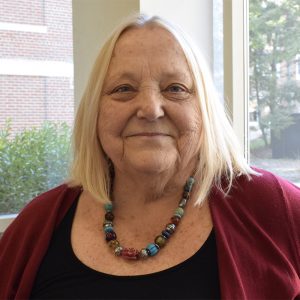Editor’s Note: In this BC Law Magazine “Vision Project” series, we are engaged in a lengthy discussion with Boston College Law School faculty about where the Covid-19 pandemic and its attendant medical, economic, racial, and political consequences may lead us. As New York Times op-ed columnist Timothy Egan so eloquently put it recently, “Every crisis opens a course to the unknown. In an eye-blink, the impossible becomes possible. History in a sprint can mean a dark, lasting turn for the worse, or a new day of enlightened public policy.” There are warnings and worries in these professors’ views, but there are also farsighted ideas and strategies for crafting a better future, a more just society, and a world in which each and every human being is equal under the law.
PROFESSOR CATHARINE WELLS
Catharine Wells is a Professor of Law and Law School Fund Research Scholar at Boston College Law School, where she teaches and writes in various areas of legal theory, including Pragmatic Legal Theory, Feminist Jurisprudence, and Civil Rights Theory. Her book, Oliver Wendell Holmes: A Willing Servant to an Unknown God, was published this year by Cambridge University Press.

What has the coronavirus pandemic revealed about our cultural norms? The pandemic has disrupted many of our habits and customs, and it will inevitably provoke major changes in our ways of life. The point about such changes is that they really are unpredictable. What would happen if half the workforce worked from home? We can’t begin to imagine all the side effects this one shift would generate.
What are the fault lines in our society? With all proper caveats about how tough it is to predict the future, I’d like to propose some questions to think about as we begin to scan the brave new world caused by Covid-19.
Racial and income disparities in the quality of life have been apparent for some time. The virus has made many people newly aware of these disparities, and more particularly, of the many ways in which they make life more miserable for those affected. For example, those who are at the lower end of the income and social scales are:
- More likely to live in crowded housing;
- More likely to rely on inadequate public transportation;
- More likely to work in low paid “essential” jobs that can’t be done at home;
- More likely to have food insecurity;
- Less likely to have adequate child care;
- Less likely to have internet access or the tools to access online education;
- Less likely to have health insurance;
- Less likely to have good medical care;
- More likely to have ongoing untreated medical issues; and
- Unlikely to have reserves of money or energy to deal with emergencies.
The virus has placed these problems in high relief. We know who is dying. It is not just the elderly. It is the people we rely on—day in and day out—to make our lives easier and better. The question is: Will we do anything about it? Are we moved enough to address the dramatic gap in living conditions that have been exposed by the virus?
What could guide us toward building and sustaining a stronger and more just society? We must place these questions in the context of the institutional racism that has infected our country. Mass incarceration and police violence are longstanding challenges for the white community. Less dramatically but equally important are the ways in which the rules and habits of daily life create obstacles for people of color. Day in, day out, our friends and colleagues of color are handicapped by our unthinking behavior—sometimes by an abundance of microaggressive comments, sometimes by a confusing array of unstated norms that favor those who are most like ourselves, sometimes by implicit bias, sometimes by profiling, sometimes by biased testing, and sometimes by overt racial prejudice.
To address these questions, white people must become racially conscious. We must examine our own privilege and its source in the pain of others. There is, of course, a need for legal reform, but the real work is personal. We must become attentive to the people around us. We must continually consider whether they pay a price for our convenience and peace of mind.
I think that there are four questions we should ask ourselves everyday: Do I invite honest responses? Am I willing to listen with an open heart? Am I willing to take responsibility for my role in perpetuating an oppressive system? Am I willing to change?
Read all faculty Vision Project interviews here.

